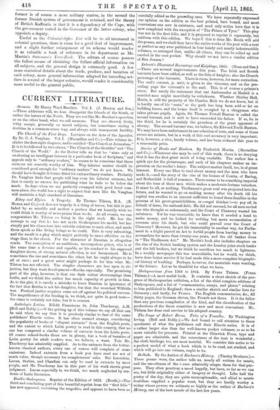Stories of Banks and Bunkers. By Frederick Martin. (Macmillan and
Co.)—Whatever else may be said of this work, there is no denying that it has the first great merit of being readable. The author has a quick eye for the picturesque, and each of his chapters makes an im- pression on the reader's fancy. The subject:matter itself, too, is of great interest. Every one likes to read about money and the men who have made it, —and the story of the rise of the houses of Coutts, of Baring, and Rothschild is full of romance. There seems to be something imperial about the tone of these men which makes a moderate fortune valueless. It must be all, or nothing. Thellusson's great soul was projected into the future, and he wanted to go on making money after his death till his capital was swollen to an amount sufficient to found three families in the persons of his great-grandchildren, or—regal thinker !—to pay off, in default of issue, the national debt. He did not succeed, for all men envied one who thought so unhumanly, and the Court of Chancery wasted his substance. Yet he was reasonable, he knew that it needed a head to make money, and he looked for nothing but mere accumulation of revenue after his death, but who could prevail over the Court of Chancery? However, he got his immortality in another way, for Parlia- ment in a fright passed an Act to forbid people from leaving money to accumulate for more than twenty-one years, and the old banker lives in " The Thellusson Act." Mr. Martin's book also includes chapters on the rise of the Scotch banking system and the London joint-stock banks and the bill brokers, but we think he sacrifices too much to lightness. In a weekly newspaper this was unavoidable, but he would, we think, have done better service if he had made this a more complete biographi- cal history of banking. Perhaps, however, the materials were wanting, or the leisure. Let us be thankful for what we have.






























 Previous page
Previous page